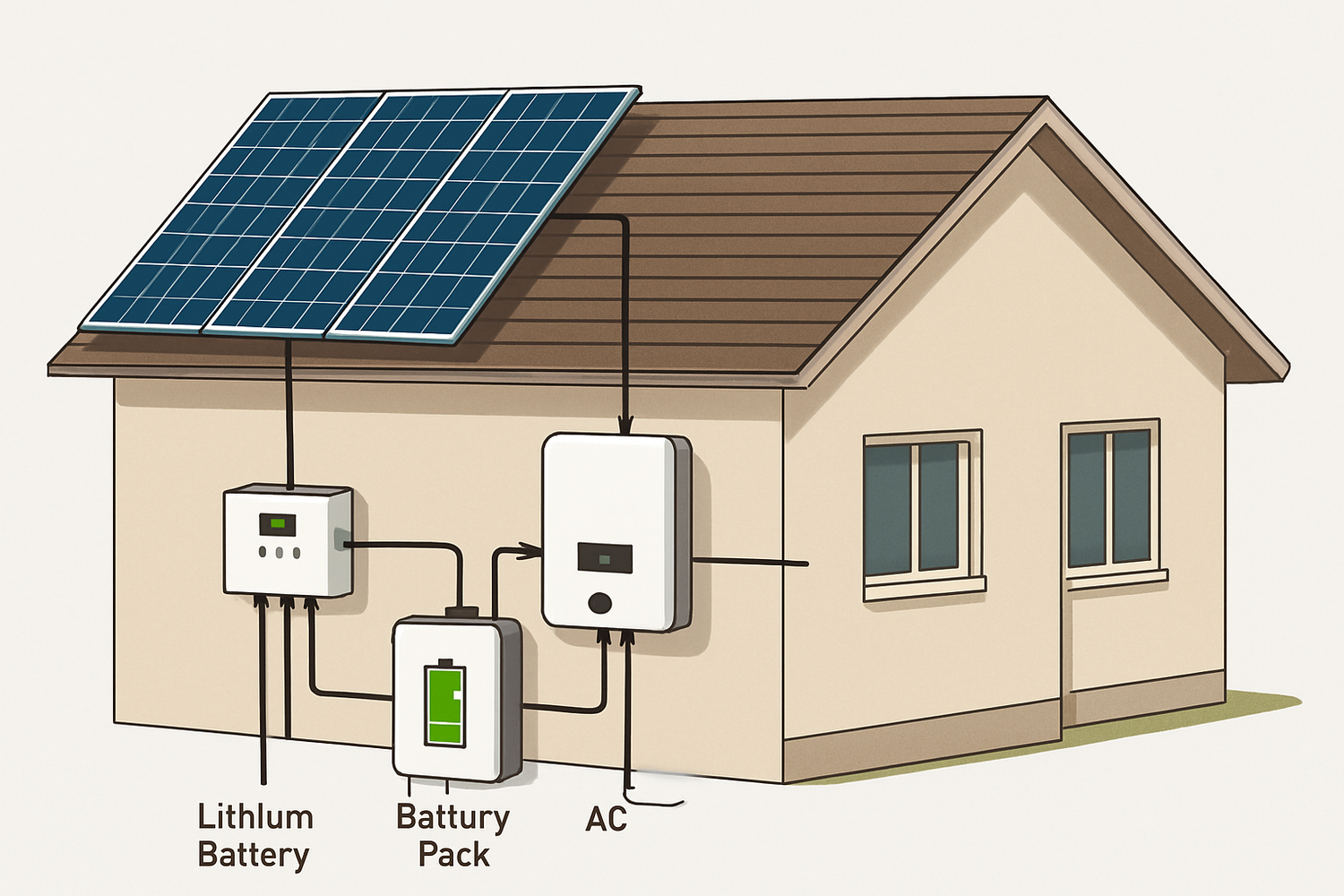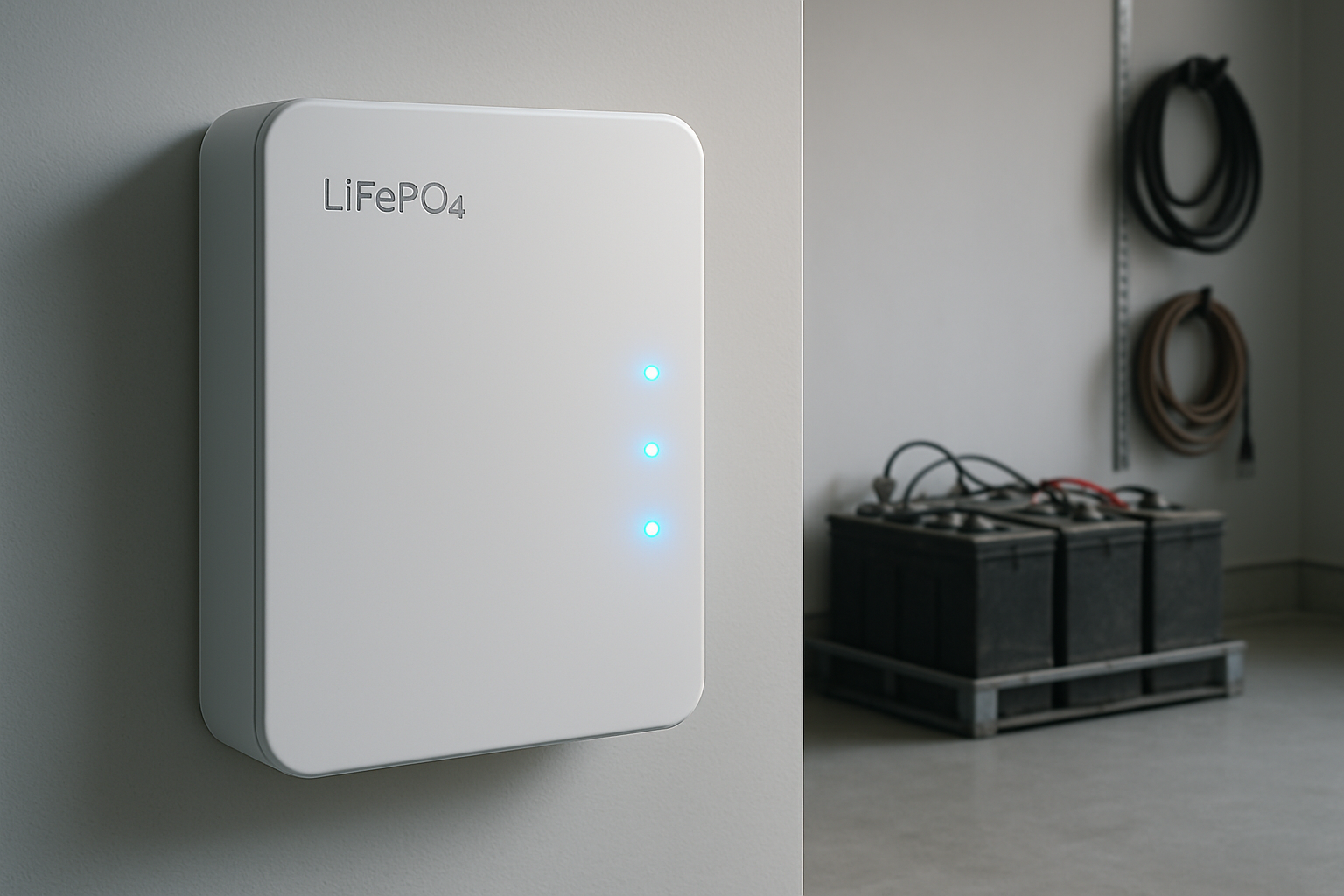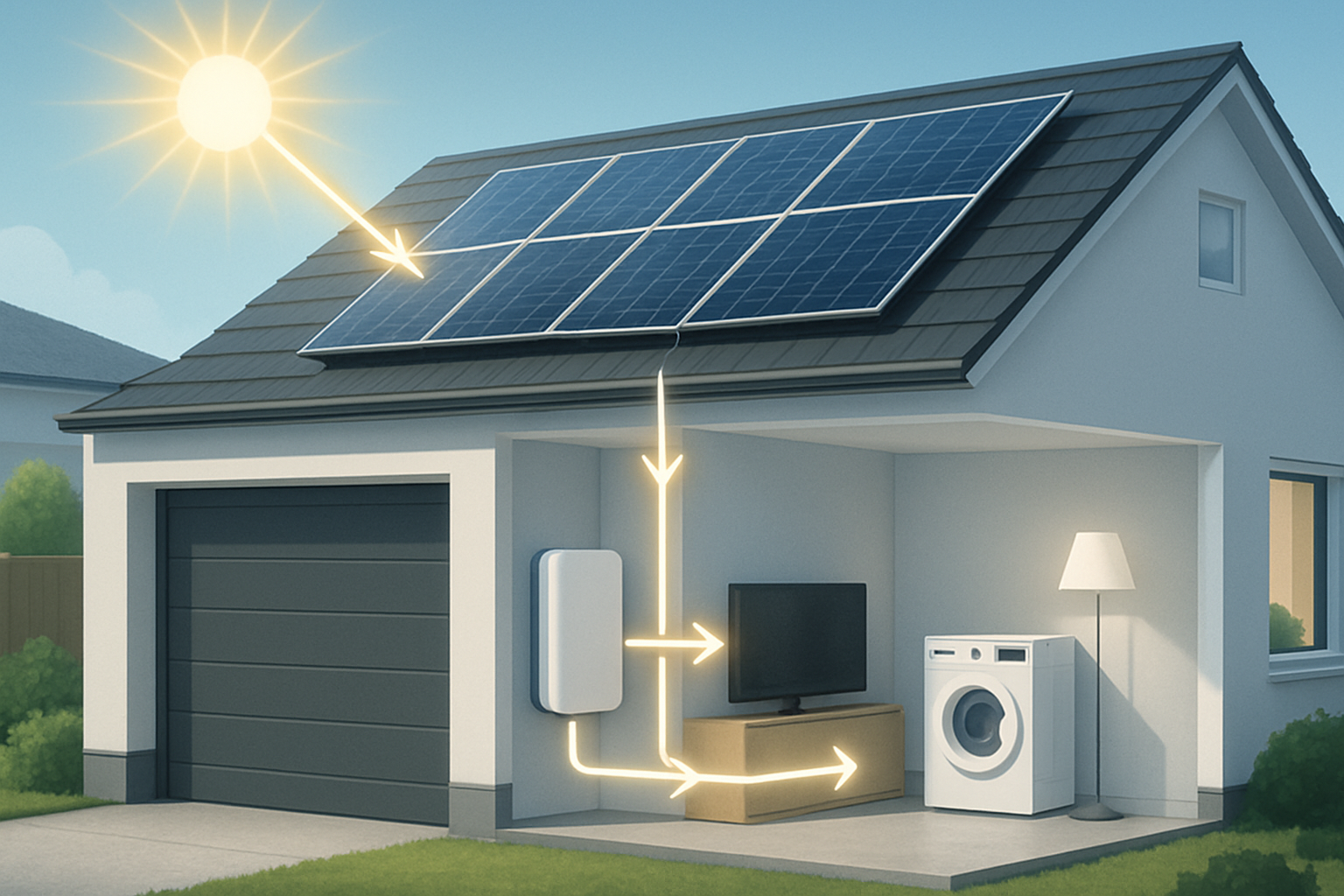As more homeowners seek energy independence, understanding the technology behind solar power systems becomes crucial. Solar panels generate direct current (DC) electricity, and batteries store energy in DC form. However, our homes and the electrical grid operate on alternating current (AC). This fundamental difference requires a conversion process, and how that process is managed determines your system's overall efficiency. This article explains the significant efficiency advantage of a DC-coupled lithium battery system for home installation, helping you make a more informed decision for your energy needs.
Understanding the Flow of Solar Energy
To appreciate the benefits of a DC-coupled system, it's helpful to first understand how solar energy travels from your panels to your appliances. This process involves generation, conversion, and storage, with each step playing a vital role in the system's performance.
The Journey from Sunlight to Usable Power
Solar panels are composed of photovoltaic cells that convert sunlight directly into DC electricity. This raw power is the starting point for any solar energy system. The challenge lies in transforming this DC power into the AC power that your television, refrigerator, and other household devices use. This is where the inverter comes into play.
The Critical Role of the Inverter
An inverter is the heart of a solar power system, responsible for converting DC electricity into usable AC electricity. Every time this conversion happens, a small amount of energy is lost as heat. While modern inverters are highly efficient, these conversion losses can add up, impacting how much of your generated solar power you can actually use or store.
Where the Battery Connects
Integrating a battery into your solar setup allows you to store excess energy for use at night or during power outages. There are two primary ways to connect a battery to your solar system: AC-coupling and DC-coupling. The key difference is where the battery is placed in relation to the inverter and the path the electricity takes before being stored.
What is a DC-Coupled Lithium Battery System?
A DC-coupled system is designed around a more direct and efficient pathway for energy storage. By minimizing the number of energy conversions, it preserves more of the valuable electricity your panels produce. This architecture is particularly effective for new solar installations.
System Architecture Explained
In a DC-coupled configuration, the DC power from the solar panels is sent to a charge controller, which then feeds the electricity directly to the lithium battery. This entire process occurs before the power reaches the main inverter. A single, sophisticated hybrid inverter then manages both the power going to your home (converting it to AC) and the charging of the battery from the panels. This creates a streamlined path: Solar Panels (DC) -> Charge Controller (DC) -> Battery (DC) -> Hybrid Inverter -> Home (AC).
The Direct Path to Storage
The primary advantage of this setup is that the solar energy is stored in the battery with only one conversion: from the DC voltage of the panels to the DC voltage of the battery. The power is only converted to AC when your home needs to use it. This avoids the multiple conversion steps found in AC-coupled systems, where solar DC power is first converted to AC, and then back to DC to charge the battery.
Synergy with Lithium Iron Phosphate (LiFePO4) Technology
Pairing a DC-coupled system with a high-performance lithium battery, such as a 12v 100ah LiFePO4 lithium battery, creates a powerful energy storage solution. LiFePO4 batteries are known for their high round-trip efficiency, meaning less energy is lost during charging and discharging cycles. According to a report from the International Renewable Energy Agency (IRENA), the choice of battery chemistry and its expected lifetime, measured in charge cycles, significantly influences the overall environmental and energy footprint of a home battery storage system. The long lifespan and safety profile of a lithium phosphate battery make it an ideal component for a reliable and efficient home energy system.
The Core Advantage: Superior System Efficiency
The main reason to choose a DC-coupled system is its efficiency. By reducing the number of times electricity changes from DC to AC and back, you waste less energy and get more value from your solar investment.
Minimizing Conversion Losses
Every power conversion results in energy loss. In an AC-coupled system, the electricity may be converted up to three times before being used from the battery. A DC-coupled system, by contrast, only requires one conversion when drawing power from the battery. This can lead to a significant increase in overall system efficiency, with some high-quality DC-coupled systems reaching over 95% round-trip efficiency. An analysis in the Ultimate Reference for Solar Storage Performance highlights that system design choices that minimize these conversion steps are crucial for maximizing the usable energy delivered by a solar storage system.
Data-Driven Comparison: DC-Coupled vs. AC-Coupled
To illustrate the difference, consider the path of energy. The table below outlines the typical conversion steps for storing and then using solar energy in both system types.
| Action | DC-Coupled System | AC-Coupled System |
|---|---|---|
| Storing Solar Energy | 1. DC (Panels) to DC (Battery) | 1. DC (Panels) to AC (Solar Inverter) 2. AC to DC (Battery Inverter) |
| Using Stored Energy | 2. DC (Battery) to AC (Hybrid Inverter) | 3. DC (Battery) to AC (Battery Inverter) |
| Total Conversions | 1-2 Conversions | 3 Conversions |
| Typical Efficiency | ~95-98% | ~90-94% |
Real-World Impact on Your Energy Bill
A higher efficiency rating means more of the sun's energy is captured and stored in your battery. This directly translates to greater energy independence and lower electricity bills. Over the 15 to 20-year lifespan of a solar energy storage system, an efficiency gain of even a few percentage points can result in substantial savings by reducing your reliance on purchasing power from the grid.
Is a DC-Coupled System Right for Your Home?
While highly efficient, a DC-coupled system is not the perfect fit for every situation. The best choice depends on whether you are installing a brand-new system or upgrading an existing one.
Ideal Scenarios for DC-Coupling
DC-coupled lithium battery systems are best suited for new home installations where the solar panels and battery storage are planned together. This allows for the selection of a compatible hybrid inverter and a seamless integration of all components from the start. They are also an excellent choice for off-grid solar solutions, where maximizing every watt of generated power is critical for energy security.
Considerations for Existing Solar Systems
If you already have a solar panel system with a standard solar inverter, adding a DC-coupled battery can be more complex. It often requires replacing your existing inverter with a hybrid model that can manage both the panels and the battery. In these retrofit scenarios, an AC-coupled battery, which has its own inverter and connects to your home's AC panel, might be a simpler and more cost-effective option to install.
Cost and Installation Factors
The initial hardware cost for a DC-coupled system can sometimes be lower because it requires only one hybrid inverter instead of separate solar and battery inverters. However, the installation can be more intricate. It is important to weigh the upfront costs against the long-term efficiency gains and energy savings when making your decision.
A More Direct Path to Energy Independence
Choosing the right energy storage solution is a significant decision. A DC-coupled lithium battery system offers a clear efficiency advantage by creating the most direct path from the sun to your battery. This design minimizes energy-wasting conversions, ensuring that more of the clean power you generate is available when you need it. For new solar installations, this approach provides a highly effective foundation for a reliable and scalable home battery storage system, moving you closer to true energy independence. As the International Energy Agency (IEA) notes in its Special Report on Batteries and Secure Energy Transitions, battery storage is a critical and fast-growing technology essential for achieving clean energy goals. Making an efficient choice today prepares your home for a sustainable energy future.
Frequently Asked Questions
What is the main difference between a DC-coupled and an AC-coupled battery?
The primary difference is how the battery connects to the solar energy system. A DC-coupled battery is charged directly with DC power from the solar panels before it reaches an inverter. An AC-coupled battery is charged with AC power after the solar energy has already been converted by a solar inverter.
Is a DC-coupled system always more efficient?
When charging the battery from solar panels, a DC-coupled system is almost always more efficient because it involves fewer power conversions. This leads to higher round-trip efficiency, meaning less energy is lost in the process of storing and retrieving power.
Can I add a DC-coupled lithium battery to my existing solar panel system?
It can be complex. Adding a DC-coupled battery to an existing system that uses a standard solar inverter typically requires replacing that inverter with a more advanced hybrid inverter. For retrofits, an AC-coupled battery is often a more straightforward solution.





Leave a comment
All comments are moderated before being published.
This site is protected by hCaptcha and the hCaptcha Privacy Policy and Terms of Service apply.